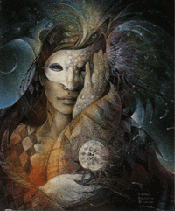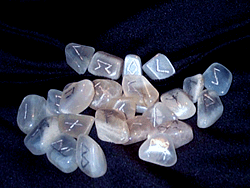
|
The White Moon Gallery Presents
a project by Rowen Saille
©
All original
material in this site is under copyright protection
and is
the intellectual property of the author.
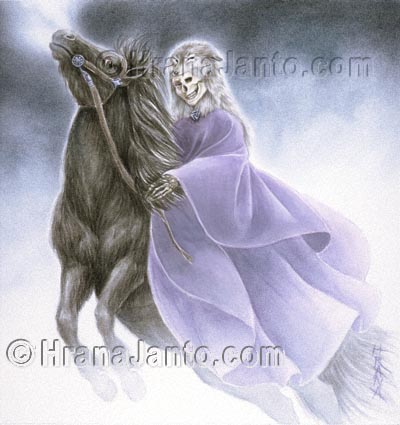

Hel is one of the most misunderstood and misinterpreted
Goddess aspects in history. She has been greatly perverted through the
years by patriarchal domination and ultimately used by the early Christian
church as a scare tactic to frighten the masses into “righteous” acts. To
get the real story, we have to go back to the early Nordic people and look
this death Goddess in the face.
According to Norse tradition, Hel is
one of three children born to Loki, the trickster, and Angrboda, the
giantess. Her body and face were described as half in light and
half in darkness. She was half dead and half alive. Her face was at
once beautiful to look upon and horrific in form. Her siblings were Fenrir, the wolf
who would destroy Asgard during Ragnarok, and Jormungand, the Midhgard serpent who
lies at the bottom of the ocean wrapped around the world
with his tail in his mouth (it is he that holds the world together).
(6, 7, 8, 9, 11, 16, 19, 21, 23)
Hel is cast into the netherworld and becomes the ruler of that underworld to which
souls who have not died in battle will depart. As thanks for making Her
ruler of the netherworld, Hel makes a gift to Odin. She gives him two
ravens, Huginn and Muninn (Thought and Memory). Ravens are messengers between this
realm and the next, opening pathways to death’s realm. (1, 4, 5,
6, 23)
Her realm is named for her, Hel or Helheim. Because She
accepts all to Helheim, she also becomes the judge to determine the fate
of each soul in the afterlife. The evil dead are banished to a realm of
icy cold death (a fate that the Nordic people found much worse in telling
than a lake of fire) and torture. This particular aspect of Hel’s realm
was the basis for the Judeo-Christian “hell” to which sinners are banished
and tortured for eternity. Unlike the Judeo-Christian concept, Helheim
also served as the shelter and gathering place of souls to be
reincarnated. Hel watches over those who died peacefully of old age or
illness. She cares for children and women who die in childbirth. She
guides those souls who do not choose the path of war and violence through
the circle of death to rebirth.(3, 6, 8, 10, 22)
Because of Hel’s special role in the deaths of mothers in childbirth and children of
all ages who die, She has become, according to some sources, the special
guardian of children. Mother Goose is believed to be based on
Frau Holle or Frau Holda who is a kindly and wise, if slightly horrific crone who
rewards the industrious and punishes the lazy. The goose aspect is
from a legend tradition that says that snow is a result of Frau Holda shaking
out her bed linens. (11, 12, 14, 15, 19)
One of the stories involving Hel is the decent of Balder into
Helheim. Loki arranged for Balder to die by tricking him into a rigged
contest. Because the contest was hosted in Asgard, Balder could not return
to that place in death. His relocation sent him to the only other realm
for the dead, Hel’s domain. His arrival to Helheim was welcomed with
banquet and festival, proof that not all of Hel’s realm was torturous. (5,
23)
Hel governs the world beyond that of the living. In magic, she makes thin the
veil between worlds. Seidhr [SAY-theer] or Nordic shamans call upon Her
protection and wear the helkappe, a magic mask, to render them invisible
(like Hades helm of invisibility) and enable them to pass through
the gateway into the realm of death and spirit. In divination, Her special
symbol is Hagalaz, hail: The embodiment of the icy realm She
rules. Hel stands at the crossroads in judgment of souls who pass into Her
realm. In that, She is linked to Osiris and Isis as well as Hecate. (2, 3,
13, 17, 20, 22)
Hel
has fallen from her privileged position as guardian and ruler through
years of being represented as an evil, ugly entity waiting to devour and
torture lost souls. Ignorance as used Her as a means of scaring children
and adults into a supposedly righteous path (instead of allowing free will
to guide their actions to do what is right). May we learn and dispel the
slander of years by seeing Her for the protector, judge, and guide that
She originally represented.
Back to menu

|
Hela - another version of the name Hel.
Also Helle.
Hecate - Guardian of the crossroads and patron of witches.
Holle - Frau Holle is the kindly mistress
who guards those who do not die in battle. She holds them in
preparation for reincarnation.
Holda - Dame Holda is a precursor to Mother
Goose. She is guardian of children who die. She shakes her feather
matress to make it
snow.
Idunna - Goddess aspect whose apples feed
the gods and give them immortality (much like the Greek
ambrosia).
Isis - Special protector and caregiver for the dead. Sits with
Osiris in judgment of souls.
Kali - Death Goddess aspect. Destroyer and bringer of life. Kali
enables reincarnation and life by destroying the old. Hel
represents this harsh Goddess aspect.
|
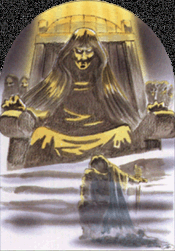
"Hel"
James Alexander
|
Back to menu

Hel
Susan Seddon Boulet
Goddesses Knowledge Cards
Purpose: To travel on the astral plane or to
contact those that have passed before.
This
ritual should be performed in the waning or new moon. It is a wonderful
Samhain ritual. Wear
white or black, or be skyclad. Have a comfortable space created for this ritual.
Need:
Candles: white and black
Incense: jasmine,
cedar, sage, myrrh, sweetgrass, citrus
Flowers: any white flowers
or white flower petals
Moonstone, clear quartz crystal, obsidian, Appache tear, or onyx (almost
any black or white
stone that
resonates with you will work).
Wand: denuded
dark wood branch, or quartz crystal - cast circle.
Representation of the rune
Hagalaz placed on the altar.
Outline:
Light candles.
Purify with incense.
Cast circle/Invoke directions
Earth - protection and grounded strength
Air - insight and communication
Fire - passion
for life and feeling
Water - peace and movement/flow
Spirit - ancestor [specific or general]
Invoke
-
"Those who have gone before carry the wisdom of the past. May we/I learn the lessons of the elders
as we/I contact the spirits this night."
Body - Take some white petals or flowers and
your chosen white or black stone. Think of the ancestor or spirit that
you wish to contact. If there is a specific issue or question that you have,
focus on that question and chant:
"Lady Hel, who guards and guides
all those who pass before us through the veil, we/I call you to
protect us/me on our/my journey."
Place the petals or
flowers in a circle around you, and hold the stone in your non-dominant
hand.
Focus your energy
into
a white circle. Imagine white light surrounding you in a protective cocoon.
Meditation -
Relax in a comfortable
position. Focus on the candles.
Feel yourself drift up with the air heated by the flame.
You feel yourself flowing up like wisps of mist. There is a border, like
a curtain, that stands between you and the astral plane. Feel yourself push against
this membrane and finally slip through, like a baby into the
world. You find yourself on a wide field. What does the field look
like? You are not alone. Who is here with you? It may be an ancestor
that needs to tell you something. It may be some spirit that wants to
share some gift with you. It may be a reflection of a prior incarnation
that wants to unveil a memory to you. Walk with them along the plane.
Know you are protected. You are under the wings of Hel, guardian of this realm. She is
protecting you. Soon, you feel Her calling. It is time for you to go. Thank your companion and
make your departure from them. Walk back to the veil. Push your
way through the curtain, and see your body enveloped in light awaiting your return.
Feel yourself flowing back into your body: Your arms, your
legs, your back against the floor. You have returned. Slowly roll to
your side and sit up.
Grounding is very important in this ritual to make sure that you are
firmly back in this plane. Eat. Interact with living family and friends.
Drink
water.
If you
are doing this as a group ritual, share hugs or hold hands
in the
circle before opening it.
Your stone
has been charged. If you want to contact your ancestor or spirit guide
from this ritual again, you can meditate on a flame and hold
the stone in your non-dominant hand. Keeping the stone by your bed when
you sleep can also reveal important wisdom from the astral plane.
Back to menu

Moonstone Runeset
Rowen Saille
Hel is a
northern Goddess aspect. As such, the divination most closely associated
with her is casting runes. Runes are an ancient alphabet system that was
used for communication on the physical and spiritual realm.
Traditionally runes consist of 24 characters which make up the
"Futhark." The 24 runes are broken up into three 8-character groups
called aetts. Later, a 25th blank rune was added to represent fate or
Wyrd. Runes can be made of wood, bone, stone, or even paper.
Traditionalists believe that bone is the most authentic material.
However, choice of material is largely a matter of resonance with
the caster.
|
Casting
Runes
(1, 3, 21, 23, 25, 26, 27,
28, 29)
Runes can be places in a bag or cup much like dice. Shake them
around, and pour them out onto a diviner's cloth (a white cloth
that may have a map or design to indicate areas of concern).
Another method is to place all the runes face-down on a surface
or leave them in their bag, and choose the number for the reading
by holding your hand over the runes and sensing whether they feel
hot or cold.
The number of runes you choose depend on the spread and the
question being asked. Rune spreads can be as simple as a single
rune or as in depth as the 25-rune "Gate of Heaven" cast. The
important part is focusing on the question or issue and asking the
divine to reveal advice to you.
Like any divination tool, it requires some practice and natural
resonance. The runes you choose for yourself are important, too.
Eventually, making a set for yourself is the best option, but for
those without time, buying a set is fine as long as you charge it
for yourself. It is easy to do. Just purify them with sage or
cedar incense. Then keep them on your person as much as possible.
Using the runes also charges them with your energy. Be sure to
purify your runes again if you have been experiencing a lot of
negative energy in your life.
Some good books and rune resources are given in the sources
section.
|
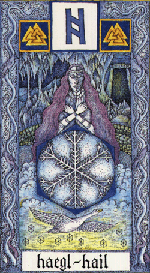
Nigel Jackson
The
Rune Oracle
|
Hel
Patricia Monaghan
I hear
you invoked
every day
by those ignorant
of your power:
Mighty Hel,
Oh
Hel.
Thus
doe she endure,
the forgotten goddess,
never far from us,
never
quite erased,
Oh Hel,
dark mother,
we always
come back
to you,
always,
Always.

Colors:
white and black
Moon phase: dark/new
Animals: owls, ravens
Herbs/Flowers: Jasmine, evergreens, any white flower
Stones:
moonstone, quartz
crystal, onyx, hematite, obsidian
Aspects: change,
compassion, death, reincarnation, just rule
Wheel of the Year: Samhain and Yule
Rune: Hagalaz - hail
Back to menu

- Arcarti, K. (1994). Runes: A beginner's guide.
London: Hodder & Stoughton
- Aswynn, F. (1998). Northern Mysteries and Magic. St. Paul, MN: Llewellyn Publications.
- Aswynn, F. (2000). Principles of Runes. London: Thorsons/HarperCollins.
- Babcock, M. Goddesses: Knowledge cards (illus.: Susan Seddon Boulet). Hong Kong: Pomegranate.
- Bulfinch's Mythology, The Age of Fable -
Chapter 38 Northern Mythology Valhalla, The Valkyrior, Thor, Loki
- Bulfinch's Mythology, The Age of Fable -
Chapter 40 The Death of Baldur, The Elves, Runic Letters, Skalds,
Iceland
- Cotterell, A. (1997). Norse Mythology: The myths and legends of the Nordic Gods. New York, NY: Lorenz Books.
- d'Aulaire, I. & d'Aulaire, E. P. (1967). D'Aulaires' Norse Gods and Giants. New York: Doubleday.
- Davidson, H. R. E. (1969). Scandinavian Mythology. London: The Hamlyn Publishing Group Ltd.
- Encyclopedia Mythica - Article Hel
- Encyclopedia Mythica - Article Helheim
- Encyclopedia Mythica - Article Holle
- Encyclopedia Mythica Norse Mythology
- Fitch, E. (1990). The Rites of Odin. St. Paul, MN: Llewellyn Publications.
- Frau Holle - http://www.pitt.edu/~dash/grimm024a.html
- Gnames - http://www.mothergoddess.com/Gnorseteutonic.html(link not active)
- Hel - (link not active)
- Hel - Hades: Comparison of Norse and Greek
Mythos - (Link not active)
- Heroes and Other Characters of Mythology - (link not active)
- HOLLE - http://www.softpaw.8m.com/
- Jackson, N. & RavenWolf, S. (1996). The Rune Oracle. St. Paul, MN: Llewellyn Publications.
- Loki's children - http://www.vikingage.com/vac/lokis-kids.html
- Meadows, K. (1996). Rune Power: The secret
knowledge of the wise ones. Boston, MA: Element Books, Inc.
- Northern Europe (Germanic) Gods-Goddesses from
The Book of Gods, Goddesses, Soul, Death and Rebirth (link not active)
- Peschel, L. (1989). A Practical Guide to The
Runes: Their uses in divination and magick. St. Paul, MN: Llewellyn Publications.
-
The Poetic Edda. Hollander, L. M. (trans.). (1962). Austin, TX: University of Texas Press.
- Thorsson, E. (1998). Northern Magic: Rune mysteries and shamanism. St. Paul, MN: Llewellyn Publications.
- Thorsson, E. (1999). Runcaster's Handbook: The well of wyrd. York Beach, ME: Samuel Weiser, Inc.
- Thorsson, E. (1987).
Runelore: A handbook of esoteric runology. York Beach, ME: Samuel Weiser, Inc.
Some of the graphics for this page were provided by

|



